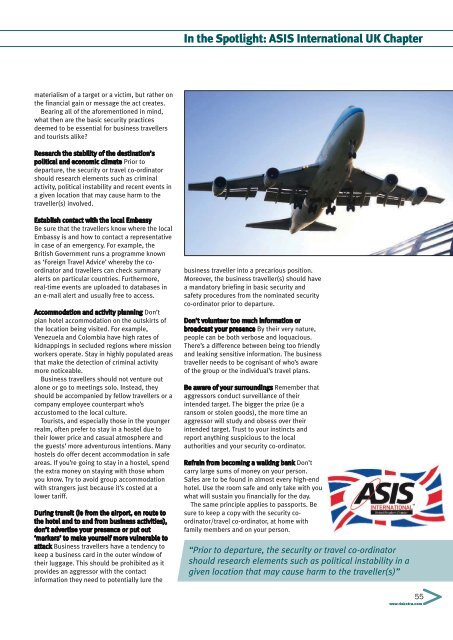RiskXtraDecember2018
You also want an ePaper? Increase the reach of your titles
YUMPU automatically turns print PDFs into web optimized ePapers that Google loves.
In the Spotlight: ASIS International UK Chapter<br />
materialism of a target or a victim, but rather on<br />
the financial gain or message the act creates.<br />
Bearing all of the aforementioned in mind,<br />
what then are the basic security practices<br />
deemed to be essential for business travellers<br />
and tourists alike?<br />
Research the stability of the destination’s<br />
political and economic climate Prior to<br />
departure, the security or travel co-ordinator<br />
should research elements such as criminal<br />
activity, political instability and recent events in<br />
a given location that may cause harm to the<br />
traveller(s) involved.<br />
Establish contact with the local Embassy<br />
Be sure that the travellers know where the local<br />
Embassy is and how to contact a representative<br />
in case of an emergency. For example, the<br />
British Government runs a programme known<br />
as ‘Foreign Travel Advice’ whereby the coordinator<br />
and travellers can check summary<br />
alerts on particular countries. Furthermore,<br />
real-time events are uploaded to databases in<br />
an e-mail alert and usually free to access.<br />
Accommodation and activity planning Don’t<br />
plan hotel accommodation on the outskirts of<br />
the location being visited. For example,<br />
Venezuela and Colombia have high rates of<br />
kidnappings in secluded regions where mission<br />
workers operate. Stay in highly populated areas<br />
that make the detection of criminal activity<br />
more noticeable.<br />
Business travellers should not venture out<br />
alone or go to meetings solo. Instead, they<br />
should be accompanied by fellow travellers or a<br />
company employee counterpart who’s<br />
accustomed to the local culture.<br />
Tourists, and especially those in the younger<br />
realm, often prefer to stay in a hostel due to<br />
their lower price and casual atmosphere and<br />
the guests’ more adventurous intentions. Many<br />
hostels do offer decent accommodation in safe<br />
areas. If you’re going to stay in a hostel, spend<br />
the extra money on staying with those whom<br />
you know. Try to avoid group accommodation<br />
with strangers just because it’s costed at a<br />
lower tariff.<br />
During transit (ie from the airport, en route to<br />
the hotel and to and from business activities),<br />
don’t advertise your presence or put out<br />
‘markers’ to make yourself more vulnerable to<br />
attack Business travellers have a tendency to<br />
keep a business card in the outer window of<br />
their luggage. This should be prohibited as it<br />
provides an aggressor with the contact<br />
information they need to potentially lure the<br />
business traveller into a precarious position.<br />
Moreover, the business traveller(s) should have<br />
a mandatory briefing in basic security and<br />
safety procedures from the nominated security<br />
co-ordinator prior to departure.<br />
Don’t volunteer too much information or<br />
broadcast your presence By their very nature,<br />
people can be both verbose and loquacious.<br />
There’s a difference between being too friendly<br />
and leaking sensitive information. The business<br />
traveller needs to be cognisant of who’s aware<br />
of the group or the individual’s travel plans.<br />
Be aware of your surroundings Remember that<br />
aggressors conduct surveillance of their<br />
intended target. The bigger the prize (ie a<br />
ransom or stolen goods), the more time an<br />
aggressor will study and obsess over their<br />
intended target. Trust to your instincts and<br />
report anything suspicious to the local<br />
authorities and your security co-ordinator.<br />
Refrain from becoming a walking bank Don’t<br />
carry large sums of money on your person.<br />
Safes are to be found in almost every high-end<br />
hotel. Use the room safe and only take with you<br />
what will sustain you financially for the day.<br />
The same principle applies to passports. Be<br />
sure to keep a copy with the security coordinator/travel<br />
co-ordinator, at home with<br />
family members and on your person.<br />
“Prior to departure, the security or travel co-ordinator<br />
should research elements such as political instability in a<br />
given location that may cause harm to the traveller(s)”<br />
55<br />
www.riskxtra.com>

















